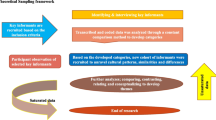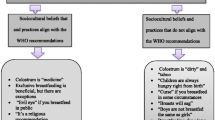Abstract
Objectives To examine perceptions, experiences, and attitudes towards breastfeeding among Hispanic women living in rural Washington State. Methods Twenty parous Hispanic women of low acculturation, aged 25–48 years and residents in rural Washington State participated in an exploratory, face-to-face interview. Interviews were audio-recorded, translated and transcribed, and analyzed using a thematic content analysis approach. Results Nine emergent themes were grouped into three overarching categories: (1) Breast is best; (2) Hispanic cultural and familial expectations to breastfeed; and (3) Adapting to life in the United States: cultural norms in conflict. Women said they were motivated to breastfeed because of their knowledge and observations of its health benefits for mother and child. They said breastfeeding is ingrained in their Hispanic cultural heritage, and infant feeding choices of female family members were particularly influential in women’s own decision to breastfeed. Women said they experienced embarrassment about breastfeeding in the United States and as a result, often chose to initiate formula feeding as a complement so as to avoid feelings of shame. Additionally, they faced economic pressure to work, key barriers for continued breastfeeding among Hispanics in the United States. Conclusions for Practice Knowledge of the benefits of breastfeeding for mother and child and longstanding cultural practices of breastfeeding are not enough to encourage exclusive breastfeeding to 6 months among this rural Hispanic population. Continued support through family-level interventions as well as work place policies that encourage breastfeeding are needed for rural Hispanics to reach optimal breastfeeding rates.
Similar content being viewed by others
References
Arenz, S., Rückerl, R., Koletzko, B., & von Kries, R. (2004). Breast-feeding and childhood obesity—A systematic review. International Journal of Obesity, 28(10), 1247–1256.
Ball, T. M., & Wright, A. L. (1999). Health care costs of formula-feeding in the first year of life. Pediatrics, 103(Supplement 1), 870–876.
Bernard, H. (2011). Research methods in anthropology: Qualitative and quantitative approaches. Lanham: Altamira Press.
Bernard, H. H. R., & Ryan, G. W. (2009). Analyzing qualitative data: Systematic approaches. Thousand Oaks: SAGE.
Bunik, M., Clark, L., Zimmer, L. M., Jimenez, L. M., O’Connor, M. E., Crane, L. A., & Kempe, A. (2006). Early infant feeding decisions in low-income Latinas. Breastfeeding Medicine, 1(4), 225–235.
Centers for Disease Control and Prevention Health Disparities and Inequalities: Morbidity and Mortality Weekly Report. (2011). Centers for Disease Control and Prevention, 60.
Chatterji, P., & Brooks-Gunn, J. (2004). WIC participation, breastfeeding practices, and well-child care among unmarried, low-income mothers. American Journal of Public Health, 94(8), 1324–1327.
DeNavas-Walt, C., & Proctor, B. D. (2014). Income and poverty in the United States: 2013. U.S. Census Bureau, Current Population Reports, pp. 60–249.
Dietz, W. H. (2001). Breastfeeding may help prevent childhood overweight. JAMA, 285(19), 2506–2507.
Gartner, L. M., Morton, J., Lawrence, R. A., Naylor, A. J., O’Hare, D., Schanler, R. J., & Eidelman, A. I. (2005). Breastfeeding and the use of human milk. Pediatrics, 115(2), 496–506.
Gibson-Davis, C. M., & Brooks-Gunn, J. (2006). Couples’ immigration status and ethnicity as determinants of breastfeeding. American Journal of Public Health, 96(4), 641.
Glazier, R. H., Bajcar, J., Kennie, N. R., & Willson, K. (2006). A systematic review of interventions to improve diabetes care in socially disadvantaged populations. Diabetes Care, 29(7), 1675–1688.
Harley, K., Stamm, N. L., & Eskenazi, B. (2007). The effect of time in the US on the duration of breastfeeding in women of Mexican descent. Maternal and Child Health Journal, 11(2), 119–125.
Horta, B. L. (2007). Evidence on the long-term effects of breastfeeding. Geneva: WHO.
Hsieh, H.-F., & Shannon, S. E. (2005). Three approaches to qualitative content analysis. Qualitative Health Research, 15(9), 1277–1288.
Ip, S., Chung, M., Raman, G., Chew, P., Magula, N., DeVine, D., et al. (2007). Breastfeeding and maternal and infant health outcomes in developed countries. Evidence Report/Technology Assessment, 153, 1–186.
Kimbro, R. T., Lynch, S. M., & McLanahan, S. (2008). The influence of acculturation on breastfeeding initiation and duration for Mexican-Americans. Population Research and Policy Review, 27(2), 183–199.
Kramer, M., & Kakuma, R. (2007). Optimal duration of exclusive breastfeeding. Cochrane database of systematic reviews. doi:10.1002/14651858.CD003517.pub2.
Mack, N., Woodsong, C., MacQueen, K. M., Guest, G., & Namey, E. (2005). Qualitative research methods: A data collectors field guide. Research Triangle Park, North Carolina: Family Health International.
National Center for Chronic Disease Prevention and Health Promotion. (2014). Breastfeeding among US children born 2001–2011. CDC National Immunization Survey. http://www.cdc.gov/breastfeeding/data/nis_data/. Retrieved 4/10/2045.
Passel, J. S., Cohn, D., & Lopez, M. H. (2011). Hispanics account for more than half of nation’s growth in past decade. Washington, DC: Pew Hispanic Center.
Rimer, B. K., & Glanz, K. (2005). Theory at a glance: A guide for health promotion practice. Washington, DC: National Institutes of Health.
Saldana, J. (2009). The coding manual for qualitative researchers. Thousand Oaks: Calif Sage.
Schmied, V., Olley, H., Burns, E., Duff, M., Dennis, C.-L., & Dahlen, H. G. (2012). Contradictions and conflict: A meta-ethnographic study of migrant women’s experiences of breastfeeding in a new country. BMC Pregnancy and Childbirth, 12(1), 163.
Shepherd-Banigan, M., Hohl, S. D., Vaughan, C., Ibarra, G., Carosso, E., & Thompson, B. (2014). “The Promotora Explained Everything”: Participant Experiences During a Household-Level Diabetes Education Program. Diabetes Educator, 40(4), 507–515. doi:10.1177/0145721714531338.
Smith-Morris, C., Morales-Campos, D., Alvarez, E. A. C., & Turner, M. (2013). An anthropology of familismo: On narratives and description of Mexican/Immigrants. Hispanic Journal of Behavioral Sciences, 35(1), 35–60.
Tarrant, M., Dodgson, J. E., & Wu, K. M. (2014). Factors contributing to early breast-feeding cessation among Chinese mothers: An exploratory study. Midwifery, 30(10), 1088–1095.
Taveras, E. M., Capra, A. M., Braveman, P. A., Jensvold, N. G., Escobar, G. J., & Lieu, T. A. (2003). Clinician support and psychosocial risk factors associated with breastfeeding discontinuation. Pediatrics, 112(1), 108–115.
Thompson, B., Coronado, G. D., Solomon, C. C., McClerran, D. F., Neuhouser, M. L., & Feng, Z. (2002). Cancer prevention behaviors and socioeconomic status among Hispanics and non-Hispanic whites in a rural population in the United States. Cancer Causes and Control, 13(8), 719–728.
US Bureau of the Census. (2002). US Census Bureau, detailed tables: Yakima County, Washington. Retrieved May 3, 2003, from http://factfinder.census.gov/serlet/DTTable?_tx=45151299924
US Department of Health and Human Services. (2011). Healthy people 2020. Washington, DC: US Department of Health and Human Services.
Victora, C. G., Wagstaff, A., Schellenberg, J. A., Gwatkin, D., Claeson, M., & Habicht, J.-P. (2003). Applying an equity lens to child health and mortality: More of the same is not enough. The Lancet, 362(9379), 233–241.
Waldrop, J. (2013). Exploration of reasons for feeding choices in Hispanic mothers. MCN: The American Journal of Maternal/Child Nursing, 38(5), 282–288.
World Health Organization. (2013). Health topics: Breastfeeding. Retrieved February 18, 2015, from http://www.who.int/topics/breastfeeding/en/
Acknowledgments
The authors would like to thank the staff at the Fred Hutchinson Cancer Research Center site office, Centro para Promover la Salud Comunitaira (Center for Community Health Promotion), and the community members of the Lower Yakima Valley who made this work possible. This project was supported by the National Cancer Institute (Grant # U54CA153502).
Author information
Authors and Affiliations
Corresponding author
Ethics declarations
Compliance with Ethical Standards
Conflict of interest
The content is solely the responsibility of the authors and does not necessarily represent the official views of the National Cancer Institute.
Rights and permissions
About this article
Cite this article
Hohl, S., Thompson, B., Escareño, M. et al. Cultural Norms in Conflict: Breastfeeding Among Hispanic Immigrants in Rural Washington State. Matern Child Health J 20, 1549–1557 (2016). https://doi.org/10.1007/s10995-016-1954-8
Published:
Issue Date:
DOI: https://doi.org/10.1007/s10995-016-1954-8




